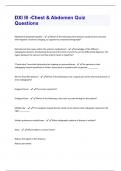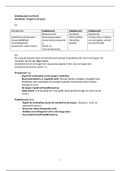Tentamen (uitwerkingen)
DXI III -Chest & Abdomen Quiz Questions with 100% Correct Answers | Latest Update | Verified
- Vak
- Instelling
Mediastinal lymphadenopathy - Which of the following chest diseases would be best assessed with magnetic resonance imaging, as opposed to computed tomography? Retrosternal clear space within the anterior mediastinum - Knowledge of the different radiographic divisions (mediastinal divisions) of t...
[Meer zien]




